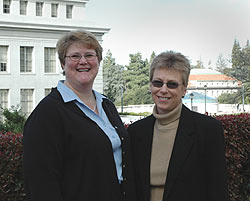Berkeleyan
Regents vote to increase role of staff in UC governance
Pilot program doesn't yet offer a seat at the big table, but staff advocates believe it's a step in the right direction
![]()
| 02 March 2005
The UC Board of Regents voted at its January meeting to include a staff member or non-Senate academic employee from the UC campuses on each of two regental committees for the next two years. The decision was hailed as a step forward by the statewide Council of UC Staff Assemblies (CUCSA), which for more than a decade has advocated a staff voice at the regents' table.
 CUCSA'S Nancy Horton and Terry Downs (Deborah Stalford photo) |
As of July 1, CUCSA chair David Miller (from UCLA) and former chair David Bell (from UCSF) will each serve a year's term on a regents' committee to be determined by UC President Robert Dynes. The committees have yet to be named (Dynes has suggested that they be the committees on educational policy and grounds and buildings), and the method for selecting Miller's and Bell's replacements for the second year of the pilot program has yet to be determined.
A three-legged stool
CUCSA activists are fond of comparing the university to a stool that stands on three legs - faculty, staff, and students. While students and faculty both have a formal representative on the Board of Regents (the student regent as a voting member, the faculty regent as a non-voting member), staff as yet do not, notes Horton. "With only two legs, the stool won't hold up. Without staff at the table, the regents are never going to get the full picture of how the university runs."
"One of our issues is that we don't have an opportunity to communicate staff concerns with regents as students and faculty do," says Berkeley Academic Senate MSO Terry Downs, Berkeley's junior delegate to CUCSA. Council officers deliver a brief annual report to regents, and staff "can offer public comment [at regents' meetings], which is like three minutes or less," Downs notes. "But a lot of the communication among regents is done offline, and we have no opportunity to be there."
Former Regent Ward Connerly, taking up this argument, proposed the addition of a staff regent to the board and "has been instrumental in raising the consciousness of his fellow regents" since the late 1990s about the value of staff input in regental deliberations, Horton says. The proposal faces several obstacles, including the fact that it would require a change to the state constitution.
"Not just worker bees"
Downs served on a committee tasked with studying how to improve staff communication with the regents as well as the feasibility of establishing a staff regent. She says the measure approved by the regents was a compromise. Although it is a two-year trial, and the staffers are non-voting committee members, she believes it will lead to a more significant role for staff in the future, once regents see "that we can provide the contributions we say we can.. We still haven't given up on the concept of sitting at the table."
"We are not just worker bees," says Downs. "We have a stake in the university and can provide an invaluable perspective about the university. This pilot is a very important first step toward a seat at the regents' table."

